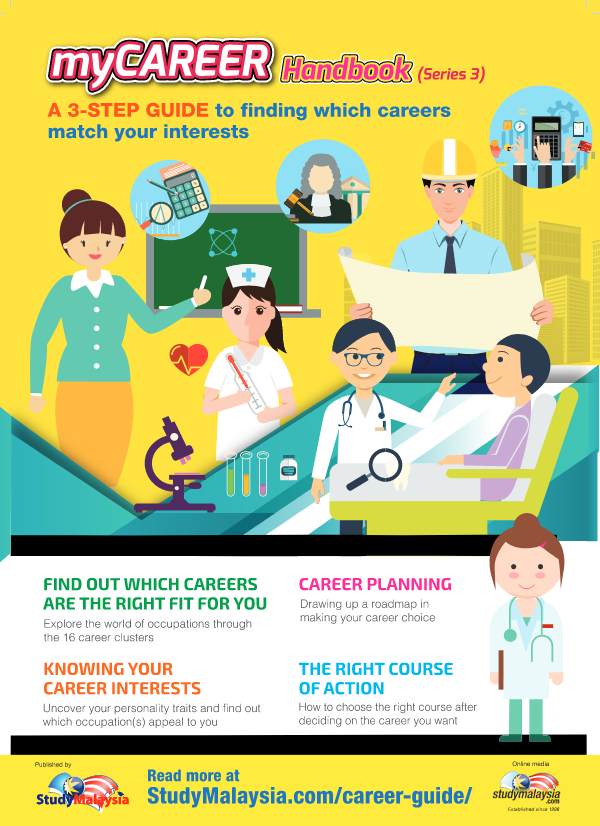Factors to consider when choosing an occupation – a quick checklist
by StudyMalaysia.com on October 4, 2022 | Top Stories

If you have already settled on a career choice, congratulations! However, it would be wise to review some important factors given below to be sure that your choice is a good fit for your personality, interests, skills, ability, and work values.
Here’s a quick checklist:
- Day-to-day tasks and work activities: Look up the job description of the occupation on the Internet - you can find them at bit.ly/OccupationMeaning. For a more accurate picture of the career you’ve chosen, read the local job ads for this position. If the job description lists tasks that you’re excited about, you’re on the right track.
If, however, you feel that it’s not what you thought it would be, you will need to review your job choices. - Knowledge: Find out what you will be studying in college or university. Every career requires a specific framework of knowledge for you to carry out the job. If you want to be an accountant but do not like Mathematics or working with numbers then something is not right somewhere. Review your choice; ideally, you should feel passionate about the knowledge you will acquire in college that will help you jumpstart your career.
We have here a reliable assessment tool to help you find out about your course interest at interest.studymalaysia.com - Evaluate your skills: Are your skills a good match for the career you have chosen? As mentioned earlier, it’s important that you evaluate and know what your skills are. Only then can you ascertain if your skills are a good match for the career you have chosen.
There are many job skills assessment tools available online. Try one!
- Work environment: This seems quite obvious, but it’s still worth mentioning – find out what a typical work environment is like for the career you’ve chosen. Do you work in an office every day? Do you work on site or travel to various sites? Do you work alone, in small teams or deal with teams of 20-30 people? Do you need to travel, work outdoors or late at night? All these play an important role in ensuring job satisfaction leading to better chances of succeeding at your job.
- Work values: Do you value achievement? Do you like being independent to make and carry out your own decisions? Do you like helping people? Is making a lot of money very important to you? Work values are the beliefs and principles that are important to you at the workplace. As these values guide your actions and ensure your happiness at your job, it is important that your chosen career is a good fit, and is supported by your work values.
- Interests: When someone asks you what career you would like to have, how many times have you answered, “I want to do something interesting”? Based on Holland’s research, work environments can be divided into six broad interest areas (RIASEC) that can be combined in many different ways. When you have determined your Holland Code, it can help you determine jobs that most likely will suit you.
There are many versions of Holland Code (RIASEC) career tests available free online. Try one of them here
- Work style: Work style is the way people at work absorb and retain new and difficult information, think or concentrate, do their daily work and solve problems. It points towards the kind of environment in which you will work most comfortably. Everyone has his or her own work style preference, and if your work style matches your job requirements, chances are that you will experience an increase in job satisfaction and an improvement in your work performance.
- Minimum academic requirements for a job: When you’ve decided on a career, you’ll need to plan for your education accordingly. These days, many advertised job positions will state a minimum academic requirement for its potential candidates—so a good guide would be to check some recruitment ads to get an idea of what educational qualifications you need for the job. These may range from a technical or skills certificate to an academic bachelor degree or a higher level degree.
- Qualifications for professional careers: While many jobs do not require a specific bachelor degree, there are some careers that have very specialised entry requirements. Professional careers like architects, doctors, engineers and lawyers require not only a degree but also a professional licence before you can practise in these fields. StudyMalaysia.com's free e-book, The Path to Attaining 11 Professional Qualifications, details about acquiring 11 professional licences to practise. Download the free e-book here bit.ly/CareerGuide11ProfessionalQualifications02
- Duration of study and obtaining licence to practise: When you consider the qualifications you need and the time required for professional registration to practise, you might realise that the number of years you need to spend studying could add up to be a lot—do consider if this is what you’re inclined to do. Also, there are many careers that you could pursue with just a diploma - these jobs may place more importance on the experience that you accumulate along the way - and you could always continue with a degree later on. Work experience can be used as an entry requirement to further your study at tertiary level when and if after working for a number of years you decide to upskill yourself. Learn more here.
- Sources of occupation information: Remember, there are many ways to find out more about a job before deciding that it’s the career you want. Besides getting information from career sources like bit.ly/OccupationMeaning, you can talk to recruiters or employers, job shadow a person working in that position, talk to seniors who have graduated and gone on to pursue a similar career, attend career fairs and talks, or speak to a career counsellor.
Copyright © STUDYMALAYSIA (www.studymalaysia.com) (September 2022)
Sources:
www.studymalaysia.com
myCAREER Handbook (Series 3), produced by STUDYMALAYSIA Sdn Bhd
myCAREER Handbook (Series 3)
A 3-step guide to deciding which careers match your interests
Your life is a result of the choices you make, so choose wisely for your career with the help of myCAREER Handbook by STUDYMALAYSIA.
 Our myCAREER Handbook (Series 3) is a 3-step guide to finding out which careers match your interests. It is a handbook that aims to help secondary school students or young working adults like you discover careers that would suit your personality style and subsequently identify suitable courses to pursue.
Our myCAREER Handbook (Series 3) is a 3-step guide to finding out which careers match your interests. It is a handbook that aims to help secondary school students or young working adults like you discover careers that would suit your personality style and subsequently identify suitable courses to pursue.
There are many benefits to choosing a job that matches one’s personality – among them are greater job satisfaction and success. Besides helping students to find their career choice, this handbook also raises their awareness regarding all possible occupations in the world. There are many career choices in the world that students may not be aware of. Occupations can be grouped into 16 career fields and students can use this book to explore these 16 career fields and the occupation options under each of these fields.
This Handbook guides students through systematically laid-out tools like self-exploration questions, interest statements, the Holland Code (RIASEC), 16 Career Clusters, checklists and more. There is a vast reservoir of information about careers and career choices out there that you may find mind-boggling. Our Handbook aims to make this information concise and available to you at the click of a finger.
To obtain a copy, buy now at Shopee.
BUY NOW AT SHOPEE!
You May Also Be Interested In...
A sweet date this Raya - Raisin Oatmeal and Date Cookies
![A sweet date this Raya - Raisin Oatmeal and Date Cookies - StudyMalaysia.com]() It’s time to crank up the oven and get your siblings, friends and co...
It’s time to crank up the oven and get your siblings, friends and co...Ten Careers In Sports You Should Consider (And You Don't Need To Be An Athlete)
![Ten Careers In Sports You Should Consider (And You Don't Need To Be An Athlete) - StudyMalaysia.com]() So you love sports? You want a career in sports but you're not qu...
So you love sports? You want a career in sports but you're not qu...�Tips for SPM Students: How to Choose a Better Study Route
![�Tips for SPM Students: How to Choose a Better Study Route - StudyMalaysia.com]() When you have decided on your choice of career, the next important ste...
When you have decided on your choice of career, the next important ste...How to discover if a career in architecture and construction is right for you
![How to discover if a career in architecture and construction is right for you - StudyMalaysia.com]() How do you find out if a career in architecture and construction is ri...
How do you find out if a career in architecture and construction is ri...�What is environmental protection all about?
![�What is environmental protection all about? - StudyMalaysia.com]() Have you always been interested in conservation but don’t know where...
Have you always been interested in conservation but don’t know where...How many ways are there to study for a bachelor degree?
![How many ways are there to study for a bachelor degree? - StudyMalaysia.com]() Private higher education institutions (PHEIs) in Malaysia provide a wi...
Private higher education institutions (PHEIs) in Malaysia provide a wi...































